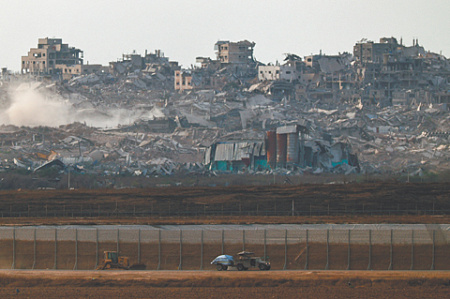
A fragile hope for peace is emerging in the Middle East as Israel has reportedly agreed to a Qatari-brokered proposal for a 60-day ceasefire in the Gaza Strip. The deal, which Hamas is currently reviewing, stands in stark contrast to escalating tensions with Iran, where a new presidential decree has halted international inspections of its nuclear program, threatening to reignite a wider regional conflict.
U.S. President Donald Trump was the first to announce Israel’s consent to the truce, stating that the White House would now work towards a permanent end to the war. “For the sake of peace in the Middle East, I hope Hamas agrees to this deal, as there will be no better terms,” Trump warned. While official confirmation from Prime Minister Benjamin Netanyahu’s office is pending, multiple Israeli media sources, citing insiders, have corroborated the president’s statement. The agreement followed intense negotiations between a U.S. delegation, including Special Envoy Steve Witkoff, and Israel’s Minister of Strategic Planning, Ron Dermer.
The proposed ceasefire outlines a multiphase exchange. Israel would secure the release of half of its 20 remaining living hostages, along with the remains of 18 deceased captives. In return, Israeli forces would withdraw to the so-called Morag line, an area in the southern Gaza Strip between Rafah and Khan Younis. However, the deal does not meet Hamas’s long-standing demand for a full Israeli withdrawal from the strategic Philadelphi Corridor along the Egyptian border.
While diplomatic efforts regarding Gaza show promise, the situation with Iran is deteriorating rapidly. In a move that could provoke a severe international response, new Iranian President Masoud Pezeshkian has signed a law officially banning inspections by the International Atomic Energy Agency (IAEA). Tehran has conditioned the resumption of monitoring on receiving vague “guarantees” against future Israeli and American strikes and for the safety of its nuclear scientists—a direct response to previous attacks on its facilities.
This decision immediately drew condemnation from Israel. Foreign Minister Gideon Sa’ar accused Iran of a “complete renunciation of its commitments on the nuclear program.” Instead of calling for immediate military action, Sa’ar urged Germany, France, and the United Kingdom—original signatories of the 2015 nuclear deal—to follow the U.S. lead and reinstate sanctions against Tehran.
Adding to the uncertainty, Iranian Foreign Minister Abbas Araghchi told CBS News that the full extent of the damage to its nuclear sites from previous strikes is still unknown. He stated that Tehran must await a full assessment before deciding if a restart is possible, confirming that the restoration of Iran’s controversial nuclear program remains a distinct possibility, keeping the region on high alert.
